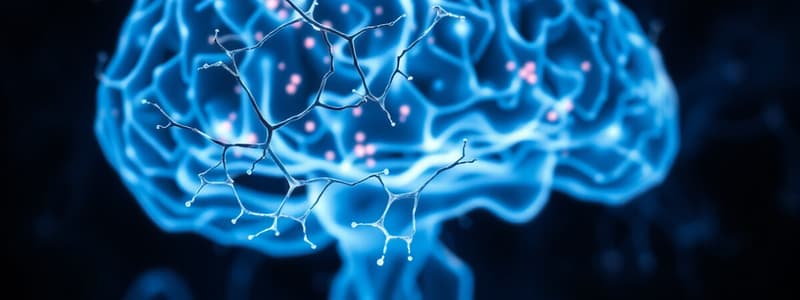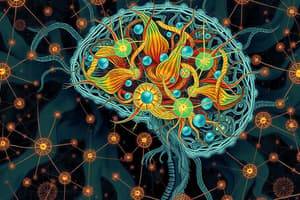Podcast
Questions and Answers
What is the primary function of neurons?
What is the primary function of neurons?
- To produce hormones.
- To transmit information throughout the nervous system. (correct)
- To regulate blood sugar levels.
- To filter waste from the brain.
Which of the following is NOT a neurotransmitter?
Which of the following is NOT a neurotransmitter?
- Serotonin
- Testosterone (correct)
- Dopamine
- Acetylcholine
The somatic nervous system is a component of which broader system?
The somatic nervous system is a component of which broader system?
- Autonomic nervous system
- Central nervous system
- Endocrine system
- Peripheral nervous system (correct)
Which of the following is a hormone that plays a role in the endocrine system?
Which of the following is a hormone that plays a role in the endocrine system?
What process involves detecting physical energy from the environment?
What process involves detecting physical energy from the environment?
Which of the following is part of the process of perception?
Which of the following is part of the process of perception?
Which aspect of consciousness would be affected by psychoactive drugs?
Which aspect of consciousness would be affected by psychoactive drugs?
What is the main focus of the gate-control theory of pain?
What is the main focus of the gate-control theory of pain?
Which of the following best describes operant conditioning?
Which of the following best describes operant conditioning?
Which type of memory is primarily used for the temporary storage and manipulation of information?
Which type of memory is primarily used for the temporary storage and manipulation of information?
Which of the following describes a biological motivation?
Which of the following describes a biological motivation?
Which stage of development primarily involves identity formation and increased risk-taking behaviors?
Which stage of development primarily involves identity formation and increased risk-taking behaviors?
Which perspective on personality emphasizes the importance of free will and self-actualization?
Which perspective on personality emphasizes the importance of free will and self-actualization?
What is the term for the change in behavior or belief towards a group standard as a result of pressure?
What is the term for the change in behavior or belief towards a group standard as a result of pressure?
Which of these describes social loafing?
Which of these describes social loafing?
Which category includes disorders characterized by excessive worry and fear?
Which category includes disorders characterized by excessive worry and fear?
Which of the following describes a key characteristic of Schizophrenia?
Which of the following describes a key characteristic of Schizophrenia?
Which type of therapy focuses on unconscious conflicts, often using dream analysis and free association?
Which type of therapy focuses on unconscious conflicts, often using dream analysis and free association?
Flashcards
Neurons
Neurons
Specialized cells that transmit information throughout the nervous system. They have dendrites, axons, and a cell body, and communicate using electrochemical signals called action potentials.
Neurotransmitters
Neurotransmitters
Chemical messengers that transmit signals across the gap between neurons (synapses). They have various effects on behavior, mood, and cognition.
Central Nervous System
Central Nervous System
The control center of the nervous system, consisting of the brain and spinal cord.
Peripheral Nervous System
Peripheral Nervous System
Signup and view all the flashcards
Sensation
Sensation
Signup and view all the flashcards
Perception
Perception
Signup and view all the flashcards
Consciousness
Consciousness
Signup and view all the flashcards
Altered States of Consciousness
Altered States of Consciousness
Signup and view all the flashcards
Observational Learning
Observational Learning
Signup and view all the flashcards
Classical Conditioning
Classical Conditioning
Signup and view all the flashcards
Sensory Memory
Sensory Memory
Signup and view all the flashcards
Short-term Memory
Short-term Memory
Signup and view all the flashcards
Encoding
Encoding
Signup and view all the flashcards
Retrieval
Retrieval
Signup and view all the flashcards
Biological Motivation
Biological Motivation
Signup and view all the flashcards
Social Motivation
Social Motivation
Signup and view all the flashcards
Problem Decomposition
Problem Decomposition
Signup and view all the flashcards
Algorithm
Algorithm
Signup and view all the flashcards
Study Notes
Introduction to AP Psychology
- Psychology is the scientific study of behavior and mental processes.
- It encompasses a wide range of topics, from basic biological processes to complex social interactions.
- AP Psychology examines key theories, research methods, and applications in the field.
- The course focuses on both historical and contemporary perspectives.
Biological Bases of Behavior
- Neurons: Specialized cells that transmit information throughout the nervous system.
- Structure includes dendrites, axons, and the cell body.
- Communicate through electrochemical signals (action potentials).
- Neurotransmitters: Chemical messengers that transmit signals across synapses.
- Examples include dopamine, serotonin, and acetylcholine.
- Have various effects on behavior, mood, and cognition.
- The Nervous System: Consists of the central (brain and spinal cord) and peripheral (somatic and autonomic) nervous systems.
- Brain regions and their functions are studied.
- Autonomic system has sympathetic (fight-or-flight) and parasympathetic (rest-and-digest) branches.
- Hormones: Chemical messengers in the endocrine system.
- Influence behavior, mood, and physiological processes.
- Examples include adrenaline (epinephrine), cortisol, and testosterone.
- Genetics and Behavior: Focus on how genes influence traits and behaviors. Nature vs nurture debate.
Sensation and Perception
- Sensation: The process of detecting physical energy from the environment.
- Sensory receptors (e.g., photoreceptors in the eye).
- Transduction of physical stimuli into neural signals.
- Perception: The process of organizing and interpreting sensory information.
- Gestalt principles (e.g., proximity, similarity).
- Depth perception and visual cues.
- Influence of experiences and expectations on perception.
- Sensory Systems: Detailed examination of different senses: vision, hearing, touch, taste, and smell.
- Specific mechanisms for each sense are studied.
- Gate-Control Theory of Pain: Explains how pain signals are processed.
States of Consciousness
- Consciousness: Understanding the individual's awareness of their thoughts, sensations, and surroundings.
- Levels of consciousness (alertness, daydreaming, sleep, hypnosis, altered states).
- Effects of drugs on consciousness.
- Sleep and Dreaming: Cycles of sleep (NREM and REM).
- Functions of sleep (e.g., restoration, memory consolidation).
- Theories of dreaming (e.g., Freud's, activation-synthesis).
- Sleep disorders (e.g., insomnia, narcolepsy).
Learning
- Classical Conditioning: Associating two stimuli.
- Unconditioned and conditioned stimuli, responses.
- Acquisition, extinction, spontaneous recovery.
- Operant Conditioning: Learning through consequences.
- Reinforcement (positive and negative) and punishment.
- Shaping behavior.
- Observational Learning: Learning by observing others.
- Modeling.
Cognition
- Memory: Encoding, storage, and retrieval of information.
- Different types of memory (sensory, short-term, long-term, working memory).
- Memory processes (e.g., encoding specificity, retrieval cues).
- Thinking and Language: Defining thinking and language.
- Problem solving (strategies, algorithms, heuristics).
- Language development (e.g., stages, acquisition, language acquisition).
- Influences on language development.
Motivation and Emotion
- Motivation: Influences behavior and goal-driven actions.
- Biological motivations (hunger, thirst, sex).
- Social motivations (affiliation, achievement).
- Emotion: Complex psychological states involving physiological, behavioral, and cognitive components.
- Theories of emotion (e.g., James-Lange, Cannon-Bard).
- Emotional expression and its influences.
Developmental Psychology
- Prenatal Development: Stages of prenatal development.
- Infancy and Childhood: Cognitive, social, and emotional development in early years.
- Adolescence: Puberty and its effects, identity formation, risk-taking behaviors.
- Adulthood: Physical, cognitive, and social changes throughout adulthood.
- Aging: Cognitive and physical changes in later life, and coping strategies.
Personality
- Theories of Personality: Different perspectives on personality, including psychodynamic, humanistic, trait, and biological.
- Assessment of Personality: Methods used to measure personality (e.g., projective tests, personality inventories).
- Personality Disorders: Characteristics and causes of personality disorders.
Social Psychology
- Social Cognition: How individuals think about other people (e.g., schemas, attribution).
- Social Influence: Conformity, compliance, obedience (e.g., Milgram's experiment).
- Interpersonal Relationships: Attraction, close relationships, aggression.
- Group Behavior: Social facilitation, social loafing, groupthink.
Abnormal Psychology
- Defining and Classifying Psychological Disorders: Categorization and diagnosis of mental illnesses.
- Anxiety Disorders: Characteristics and possible treatments.
- Mood Disorders: Characteristics and possible treatments.
- Schizophrenia: Characteristics and possible treatments.
- Other Psychological Disorders: Specific diagnoses and treatments (e.g., personality disorders, eating disorders).
Treatment of Psychological Disorders
- Psychotherapy Approaches: Different types of therapy (e.g., psychodynamic, humanistic, behavioral).
- Biomedical Approaches: Medication, electroconvulsive therapy (ECT), other biological interventions.
Studying That Suits You
Use AI to generate personalized quizzes and flashcards to suit your learning preferences.




